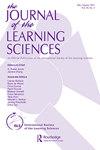“Run it through me:” Positioning, power, and learning on a high school robotics team
IF 3
1区 教育学
Q1 EDUCATION & EDUCATIONAL RESEARCH
引用次数: 14
Abstract
ABSTRACT Background: Scholars have analyzed the possibilities that robotics-centered learning programs offer, including opportunities for developing collaboratively and engaging in authentic STEM professional practice. This work adds a sociopolitical perspective, explicating a case of a newcomer to a robotics team that elucidates the nuances of in-the-moment social positioning and its enduring impact on youth’s participation in afterschool STEM learning environments. Methods: Through interaction analysis of three episodes and ethnographic perspectives, participants’ contributions to social interaction are analyzed as chronotopes, or spacetime representations, to understand how Denisse’s, a young Black and Latinx woman, role as the driver of the team’s robot at competitions is collaboratively crafted, building on the feminist tradition of positioning theory. Findings: My analysis shows that Denisse is both empowered, through co-production of future decision-making in practice, and disempowered, through the rejection of non-present spacetime storylines at the competition. Further, notions of expertise and ownership are brought to bear on interactions, together with racialized and gendered narratives across the negotiations of the role of the driver to limit Denisse’s local social power. Contribution: This story shares how representation is not enough for educational justice for minoritized youth and informs how STEM education communities must take on the task, together.“跟我说一遍:”高中机器人团队的定位、权力和学习
背景:学者们分析了以机器人为中心的学习计划提供的可能性,包括协作发展和参与真正的STEM专业实践的机会。这项工作增加了社会政治视角,阐述了一个机器人团队新人的案例,阐明了当下社会定位的细微差别及其对青少年参与课后STEM学习环境的持久影响。方法:通过三个情节的互动分析和民族志视角,参与者对社会互动的贡献作为时间点或时空表征进行分析,以理解Denisse,一个年轻的黑人和拉丁裔女性,作为团队机器人驾驶员的角色是如何在女性主义传统定位理论的基础上协同塑造的。研究发现:我的分析表明,丹尼斯在实践中通过共同制定未来的决策而获得了权力,而在比赛中通过拒绝不存在的时空故事情节而被剥夺了权力。此外,专业知识和所有权的概念也被引入到互动中,以及在司机角色的谈判中种族化和性别化的叙述,以限制丹尼斯在当地的社会权力。贡献:这个故事告诉我们,对于少数族裔青年来说,代表性是如何不足以实现教育公正的,并告诉我们STEM教育社区必须如何共同承担这一任务。
本文章由计算机程序翻译,如有差异,请以英文原文为准。
求助全文
约1分钟内获得全文
求助全文
来源期刊

Journal of the Learning Sciences
Multiple-
CiteScore
10.70
自引率
5.30%
发文量
17
期刊介绍:
Journal of the Learning Sciences (JLS) is one of the two official journals of the International Society of the Learning Sciences ( www.isls.org). JLS provides a multidisciplinary forum for research on education and learning that informs theories of how people learn and the design of learning environments. It publishes research that elucidates processes of learning, and the ways in which technologies, instructional practices, and learning environments can be designed to support learning in different contexts. JLS articles draw on theoretical frameworks from such diverse fields as cognitive science, sociocultural theory, educational psychology, computer science, and anthropology. Submissions are not limited to any particular research method, but must be based on rigorous analyses that present new insights into how people learn and/or how learning can be supported and enhanced. Successful submissions should position their argument within extant literature in the learning sciences. They should reflect the core practices and foci that have defined the learning sciences as a field: privileging design in methodology and pedagogy; emphasizing interdisciplinarity and methodological innovation; grounding research in real-world contexts; answering questions about learning process and mechanism, alongside outcomes; pursuing technological and pedagogical innovation; and maintaining a strong connection between research and practice.
 求助内容:
求助内容: 应助结果提醒方式:
应助结果提醒方式:


